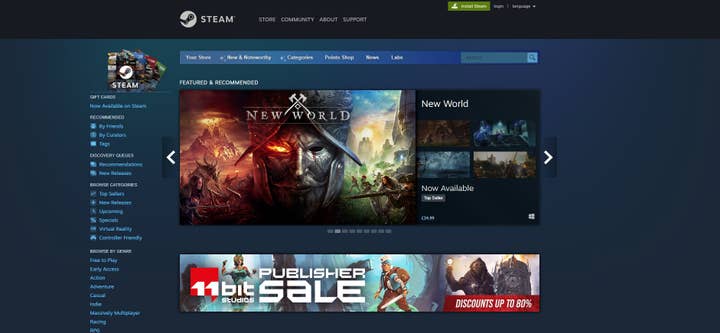Amazon could be Valve's only serious challenger | Opinion
With Twitch as its springboard, leaked Steam competitor Vapor could be the biggest disruption to the PC market in decades
It's been a rollercoaster few weeks for Amazon Games.
The launch of its MMORPG title New World looked like its first genuine shot at a hit title, with enormous interest in the game resulting in overloaded servers and long queues for players -- not a great look for the world's leading provider of cloud services, perhaps, but a positive sign for the game's future. That's a big deal for the division, whose previous major efforts haven't even made it to the starting line -- the most recent no-show being Crucible, which was cancelled outright after a poor reaction to its beta launch last year.
For executives in Amazon's gaming arm, however, any sense of jubilation at the strong response to New World has likely been forgotten in the week's subsequent events, as an enormous security breach saw the leak of tens of gigabytes of code and data related to the company's games division and its game streaming subsidiary, Twitch.
Maybe New World ends up being a huge hit, but even if it fizzles out, Twitch will still be pulling in gigantic audiences day after day
Thus far, the absolute worst-case scenario for this leak doesn't seem to have happened -- while a large amount of private data has been revealed, users' security doesn't seem to have been directly compromised. All the same, whatever anyone's views may be of Twitch, Amazon, or Jeff Bezos and his phallic spaceships, the amount of private information that is included in the leaked files (notably income numbers for Twitch streamers, who have been caught in the crossfire of whatever issue the leakers have with Amazon) makes the whole thing very hard to justify.
One key thing that's included in the data, though, is of particular interest to anyone who's been trying to divine what exactly Amazon's strategy in the games sector might be. The company's actions with regard to gaming in the past half-decade or so have been confusing, to say the least -- there's always been a strong sense that Amazon feels like it should be doing something related to games (hence the existence of Amazon Games in the first place), but since the acquisition of Twitch in 2014, it's never seemed like a priority for the company's management and where its gaming strategy was actually leading has been very unclear.
In light of that, the confirmation that Amazon has been working on a digital distribution platform that's designed to compete with Steam -- an objective that's even made perfectly clear by its working codename, "Vapor" -- suddenly brings quite a few things into focus, and suggests a path forward for Amazon's ambitions that could have a pretty big impact on the PC games market overall.
Vapor seems, to all intents and purposes, to be a pretty fully-featured Steam competitor that's deeply integrated with Twitch -- indeed, it wouldn't be surprising if the version of it we finally see officially is called something like the Twitch Games Store. That may not sound like anything groundbreaking, given Steam's continuing dominance of the PC digital distribution space -- but it could well be a far more disruptive move than it appears at first glance.
First up, it should be unsurprising that Twitch is really the heart of Amazon's gaming ambitions. The company would undoubtedly like for its efforts at game development and publishing to bear some fruit, of course -- it knows from its work on establishing Prime Video as a key streaming platform how important first-party content is -- but the one genuinely successful thing it owns in the gaming space right now is Twitch, and it's logical to build out the rest of its ambitions from that platform rather than crossing its fingers and hoping really hard that one of its swings at launching a major online game hits it out of the park. Maybe New World ends up being a huge hit, but even if it fizzles out, Twitch will still be pulling in gigantic audiences day after day.

The core idea of building out from Twitch to create a store which allows game streaming viewers to have a seamless purchase or subscription process for games they're watching on a stream, or that are recommended by their favourite streamers, is an obvious idea, but no less important for it. We already know that being played and endorsed by streamers is an essential part of the game marketing and sales process for PC titles today -- in the sub-AAA space in particular, most developers and publishers can relate anecdotes about game launches that have hinged on promotional support from streamers. Smoothing over the channel between stream and purchase could be a very big deal as a consequence -- and the commercial potential of allowing game creators to easily strike revenue sharing and referral deals with streamers is enormous, even if the moral and ethical implications aren't necessarily comfortable.
Of course, Vapor, or the Twitch Store, or whatever it ends up being called, wouldn't be the first attempt to dislodge Steam from its perch -- but even leaving aside the sheer retail muscle represented by having Amazon behind it, this store would arguably be the first to try to disrupt the PC digital distribution space in a way that actually understands how business disruption works in the 21st century.
Launching a Steam competitor that integrates directly into Twitch is much more disruptive and potentially market-altering because Twitch has what Epic doesn't: a gigantic built-in consumer base
Previous would-be challengers to Valve's empire have been conceptualised as stores in the very traditional sense -- they focus most of their attention on the challenge of creating a store that's appealing to the companies who will provide it with products to sell, taking an "if you build it (and stock it with enough good products), they will come" approach to the consumers themselves. That's especially true of the Epic Games Store, whose most high-profile innovations are aimed at the people who make products (game developers and publishers), while the actual consumer experience has lagged behind Steam's in terms of functionality from the outset.
This traditional notion of building a business like this -- where the key challenge is bundling together attractive products that will entice consumers to use your store -- is understandably attractive to a company like Epic, since it places game developers at the heart of the whole model. Most successful business disruption in the 21st century, however, has gone in exactly the other direction -- businesses instead bundle together large volumes of consumers, and offer access to those consumers to companies who wish to sell them products. Ride-hailing services like Uber and Lyft do not, at heart, focus on offering a selection of drivers to consumers -- rather, they have a large audience of consumers, and effectively sell access to those consumers to drivers who wish to sell their services. Deliveroo and Uber Eats sell restaurants and delivery workers access to a large customer base. AirBnB sells access to its customer base to people running home rental businesses. Love or hate how these businesses function, the model is always the same at heart.
Amazon understands this model incredibly well, because while the company may have started out with a business model that resembled a traditional bookstore, the intervening decades have turned it into exactly this kind of disruptive business. It now operates less like a traditional retailer and more like a portal through which product manufacturers, importers and so on can access a huge swathe of consumers around the world -- the tens if not hundreds of millions of people whose first instinct whenever they need to buy something is to search for it on Amazon, not Google or anywhere else. Access to those consumers is Amazon's product, and they're happy to sell their customers -- product manufacturers and suppliers -- all manner of different ways to gain access to this market, from marketplace listings to complete fulfilment services.
That's also, essentially, how Steam operates. Just like Amazon, Steam isn't a monopoly -- plenty of competitors exist and in theory, the bar to market entry isn't all that high -- but at its heart Steam is a service that has a gigantic group of captive consumers (let's say, oh, the entire PC gaming market, give or take) and offers access to them to publishers and developers.
One of the reasons the Epic Games Store has struggled to gain both traction and goodwill is because its creators don't seem to have understood this important distinction; they thought the battle worth fighting was over on the supply side and thus focused on appealing to product creators, but failed to pay sufficient attention to the demand side and work on the (admittedly much, much harder) task of wresting the customer base away from Valve. Launching a Steam competitor that integrates directly into Twitch is a much more disruptive and potentially market-altering move precisely because Twitch has what Epic doesn't: a gigantic built-in consumer base. By selling games directly through the most popular streaming platform on the market, Amazon will have essentially already solved the audience problem that Epic hasn't even really started to tackle.
The real question, I'd argue, is why this hasn't happened yet; why are we hearing about Vapor through a leak of hacked code and data, rather than having an actual storefront available right now? It's unusual that Amazon, a company that generally moves fast when it has a clear ambition, has taken seven years to take this next step for Twitch. Perhaps its well-documented difficulties in getting first-party development up and running might have held things back, with the firm drawing on its experiences with Prime Video and thus not confident to go head-to-head with Valve (and now Epic) until it had some decent first-party titles to anchor the service.
It's equally likely, though, that the fact that we're only getting confirmation of Vapor's existence now -- and that it remains, well, vapour -- is a sign that Amazon's actual strategy in the games space remains unfocused and low-priority. If that's the case, even the enormous advantage offered by Twitch is likely to be squandered -- no matter how disruptive your business idea may be, you don't beat an incumbent market player like Valve by coming to the fight distracted and half-cocked.
Amazon is probably better positioned than any other company in the world to make itself into a huge player in this market -- but if doing so isn't a strategic priority, then Vapor might well be best off staying in the realm of code leaks and internal blue-sky thinking.

